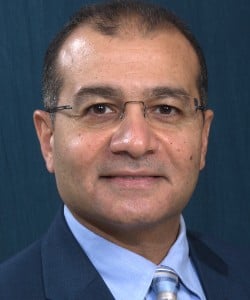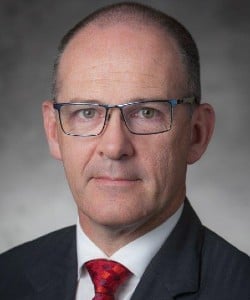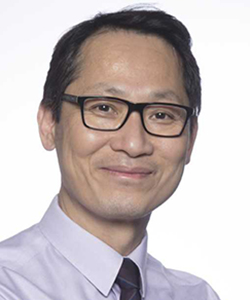Peripheral Nerve Stimulation in the Acute Pain Setting
Live Webinar
Registration is now closed.
CME Certificates Educational Webinars
Overview
The use of percutaneous peripheral nerve stimulation (PNS) as an opioid-sparing technique may not be widely appreciated in the acute pain setting and is currently under-used in clinical settings. In this webinar, faculty will discuss the rationale and evidence for the use of percutaneous PNS in the acute setting and provide clinical scenarios where this technique can be used. Best practices, safety profile, and limitations also will be addressed.
Topics include
- Basics of PNS and neuromodulation in percutaneous PNS
- Differences between PNS and transcutaneous electrical nerve stimulation (TENS)
- Clinical application of percutaneous PNS in acute pain management
- Current evidence of efficacy of PNS in treating acute pain
- Benefits of using PNS
- Limitations of percutaneous PNS in acute pain management
- Future directions
Faculty
Scientific/Education Planning Committee
Stuart Grant, MD, ChB, MMCI; University of North Carolina at Chapel Hill, NC
Vivian Ip, MBChB, FRCP; University of Alberta Hospital, Alberta, Canada
Faculty
Hesham Elsharkawy, MD, MBA, MSc, FASA; Case Western Reserve University/ Cleveland Clinic, Westlake, OH
Stuart Grant, MD, ChB, MMCI; University of North Carolina at Chapel Hill, NC
Vivian Ip, MBChB, FRCP; University
of Alberta Hospital, Alberta, Canada
Ban Tsui, MD; Stanford University, Palo Alto, CA
 Hesham Elsharkawy, MD, MBA, MSc, FASA, is
a staff member in the Anesthesia Institute and Outcomes Research at Cleveland Clinic. He is also associate professor at Case Western Reserve University in Cleveland, OH. His clinical and research interest includes ultrasound technology, interfascial
plane blocks, quadratus lumborum blocks, and innovation in pain. He has directed many workshops and given lectures nationally and international. He has an MBA degree from Cleveland State University and is board certified by the ABA and NBE.
Hesham Elsharkawy, MD, MBA, MSc, FASA, is
a staff member in the Anesthesia Institute and Outcomes Research at Cleveland Clinic. He is also associate professor at Case Western Reserve University in Cleveland, OH. His clinical and research interest includes ultrasound technology, interfascial
plane blocks, quadratus lumborum blocks, and innovation in pain. He has directed many workshops and given lectures nationally and international. He has an MBA degree from Cleveland State University and is board certified by the ABA and NBE.
 Stuart Grant, MBChB, MMCI, trained
in Glasgow Scotland before moving to the US. He is chief of regional anesthesiology at the University of North Carolina Chapel Hill. He serves on the ASRA CME committee and directs the free standing UGRA courses for ASRA. His textbook
“Ultrasound Guided Regional Anesthesia” is now in its second edition.
Stuart Grant, MBChB, MMCI, trained
in Glasgow Scotland before moving to the US. He is chief of regional anesthesiology at the University of North Carolina Chapel Hill. He serves on the ASRA CME committee and directs the free standing UGRA courses for ASRA. His textbook
“Ultrasound Guided Regional Anesthesia” is now in its second edition.
 Vivian Ip, MB ChB, is
an associate clinical professor of anesthesia at the University of Alberta Hospital in Edmonton, Canada. She is one of the leaders of the Fentanyl Crisis Campaign known as Doctors against Tragedies. She was previously the director of the Ambulatory
Regional Anesthesia Program at the University of Alberta hospital. She received her anesthesia training in London, UK. Subsequently, she undertook two fellowships in Canada: Regional Anesthesia and Acute Pain Management, and Ambulatory Anesthesia.
She is actively involved in ASRA, previously served on the Research Committee, and will take on the associate editor role on the Newsletter Committee in Spring, 2018. She is also active in research and her research interests include regional nerve
block catheters, airway, and green anesthesia.
Vivian Ip, MB ChB, is
an associate clinical professor of anesthesia at the University of Alberta Hospital in Edmonton, Canada. She is one of the leaders of the Fentanyl Crisis Campaign known as Doctors against Tragedies. She was previously the director of the Ambulatory
Regional Anesthesia Program at the University of Alberta hospital. She received her anesthesia training in London, UK. Subsequently, she undertook two fellowships in Canada: Regional Anesthesia and Acute Pain Management, and Ambulatory Anesthesia.
She is actively involved in ASRA, previously served on the Research Committee, and will take on the associate editor role on the Newsletter Committee in Spring, 2018. She is also active in research and her research interests include regional nerve
block catheters, airway, and green anesthesia.
 Ban Tsui, MD,
has the primary interest and objective of his research to transform regional anesthesia from an "art" into a reliable and reproducible "science" by further exploring the basic scientific and clinical aspects of electrophysiological signal monitoring
and integrating this with the latest advances in ultrasound. Dr. Tsui has a strong interested in mentoring and motivating residents and anesthesiologists fellows to incorporate research into their clinical practice. Dr. Tsui has received Clinical
Scholar funding from the Alberta Heritage Foundation for Medical Research (AHFMR) since 2002. Dr. Tsui is the recipient of the 2014 Dr. R.A. Gordon Research Award from the Canadian Anesthesiologists' Society (CAS). He has previously received funding
from the Canadian Institutes of Health Research (CIHR) and multiple awards from CAS.
Ban Tsui, MD,
has the primary interest and objective of his research to transform regional anesthesia from an "art" into a reliable and reproducible "science" by further exploring the basic scientific and clinical aspects of electrophysiological signal monitoring
and integrating this with the latest advances in ultrasound. Dr. Tsui has a strong interested in mentoring and motivating residents and anesthesiologists fellows to incorporate research into their clinical practice. Dr. Tsui has received Clinical
Scholar funding from the Alberta Heritage Foundation for Medical Research (AHFMR) since 2002. Dr. Tsui is the recipient of the 2014 Dr. R.A. Gordon Research Award from the Canadian Anesthesiologists' Society (CAS). He has previously received funding
from the Canadian Institutes of Health Research (CIHR) and multiple awards from CAS.
CME-CPD
Educational objectives
After participating in this educational activity, participants should be able to:
- Describe the mechanism of neurostimulation in treating acute pain.
- Apply the current evidence in treating acute pain with non-opioid strategies using PNS.
- Compare and contrast Peripheral nerve stimulation (PNS) and transcutaneous electrical nerve stimulation (TENS).
- Evaluate the benefits and limitations of PNS in clinical scenarios.
Target audience
The educational activity is designed for the physician learner who is interested in clinical use of peripheral nerve stimulation in the care of individuals in the acute pain setting.
Accreditation and credit designation statements
Credits by Day | Maximum |
June 30, 2020 | 1.25 |
Total Credits: | 1.25 |
Physicians
The American Society of Regional Anesthesia and Pain Medicine is accredited by the Accreditation Council for Continuing Medical Education (ACCME) to provide continuing medical education for physicians.
The American Society of Regional Anesthesia and Pain Medicine designates "internet activity enduring material" for a maximum of 1.25 AMA PRA Category 1 Credits™. Physicians should claim only the credit commensurate with the extent of their participation in the activity.
PAs (Physicians Assistants): AAPA accepts certificates of participation for educational activities certified for AMA PRA Category 1 Credit™ from organizations accredited by ACCME or a recognized state medical society. Physician assistants may receive a maximum of 1.25 hours of Category 1 credit for completing this program.
Nurse Practitioners: The American Association of Nurse Practitioners (AANP) accepts AMA PRA Category 1 Credits™ from organizations accredited by the ACCME. This activity has been approved for a maximum of 1.25 AMA PRA Category 1 Credits.TM
Registered Nurses: Regulations dictate that only physicians may earn CME credits, however, many state Boards of Registered Nursing accept AMA PRA Category 1 Credits™ from organizations accredited by the ACCME. Attendees are responsible for confirming their specific board’s acceptance of ASRA-provided credits. This activity has been approved for a maximum of 1.25 AMA PRA Category 1 Credits.TM
The American Board of Anesthesiology® MOCA®1
This activity contributes to the CME requirements for Part II: Lifelong Learning and Self-Assessment of the American Board of Anesthesiology’s (ABA) redesigned Maintenance of Certification in Anesthesiology Program® (MOCA®), known as MOCA 2.0.TM Please consult the ABA website, www.theABA.org, for a list of all MOCA 2.0 requirements. Maintenance of Certification in Anesthesiology Program® and MOCA® are registered certification marks of The American Board of Anesthesiology.®
ASRA is an ABA-approved provider and, as a service to ASRA members and participants, CME credits are reported to the ABA. Participants must include their correctly formatted ABA ID number (34567890) during the online evaluation and credit claim process available at the conclusion of the activity. Once the online evaluation and credit claim process is closed, certificates will be issued and credits reported to the ABA. After this time, participants may request their CME certificate by contacting [email protected], but ASRA will no longer report credits to the ABA, which will then be the individual participant’s responsibility.
International credits
Royal College of Physicians and Surgeons of Canada: The Royal College of Physicians and Surgeons of Canada has agreements based on the mutual recognition of credit points with the American Medical Association for live and web-based (synchronous or asynchronous) educational events. You may submit your CME certificate directly for credit recognition of this accredited group learning activity (Section 1) as defined by the Maintenance of Certification program of The Royal College of Physicians and Surgeons of Canada. For more information, visit: www.royalcollege.ca
European Accreditation Council for Continuing Medical Education (UEMS-EACCME): The UEMS-EACCME has agreements based on the mutual recognition of credit points with the American Medical Association for live and e-learning educational events. Each medical specialist should claim only those hours of credit that he/she actually spent in the educational activity. The EACCME is an institution of the European Union of Medical Specialists (UEMS): www.uems.net
Commercial support disclosure
No industry support has been received for this educational activity.
Disclosure and resolution of personal conflicts of interest
Click here to view all faculty disclosures. In accordance with the ACCME’s Standards for Commercial Support and related policies, ASRA is committed to ensuring balance, independence, objectivity, and scientific rigor in its CME/CPD activities. Those in control of the educational content disclose all relevant relationships (financial or other) with any commercial interest that they or their spouse/partner have had within the past 12 months. If an individual refuses to disclose, they are disqualified from participating. Disclosure information is evaluated and conflicts of interest resolved. Disclosure is made to participants prior to the activity. Participants are asked to evaluate the objectivity and independence. Off-label or investigational use of a therapeutic product is also disclosed.
1Maintenance of Certification in Anesthesiology™ program and MOCA® are registered trademarks of The American Board of AnesthesiologyTM